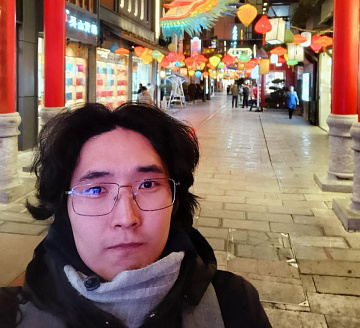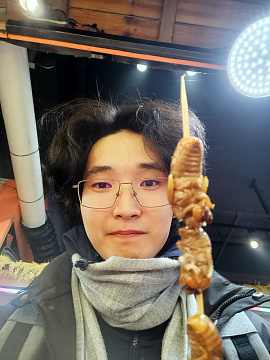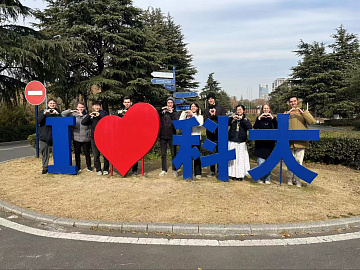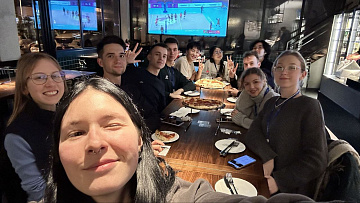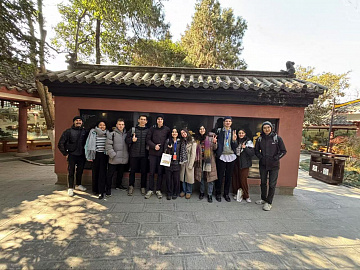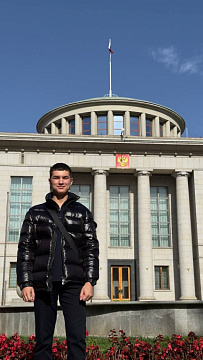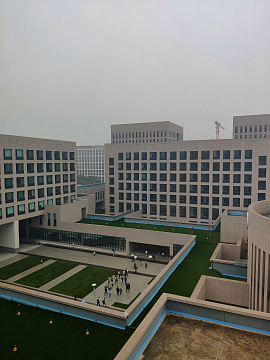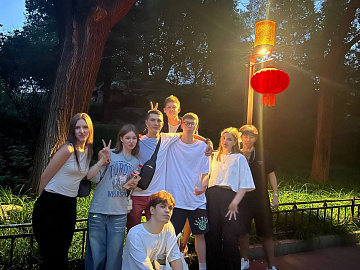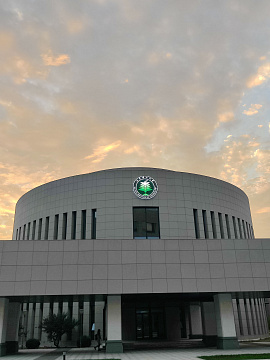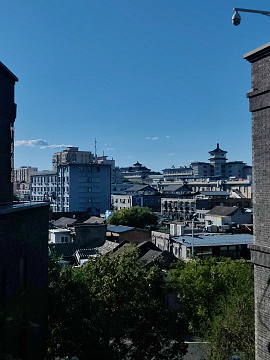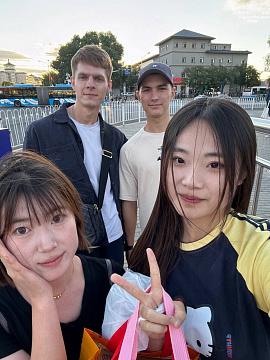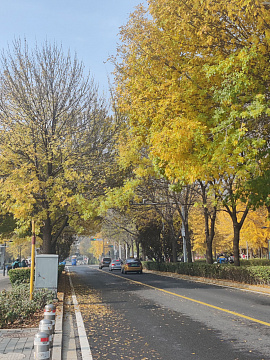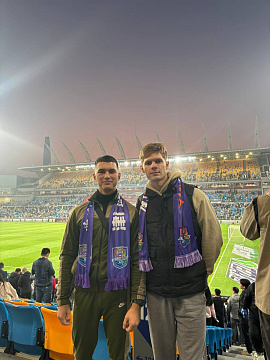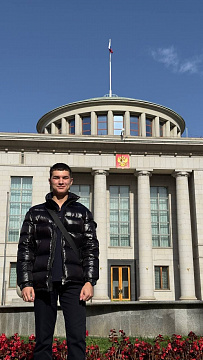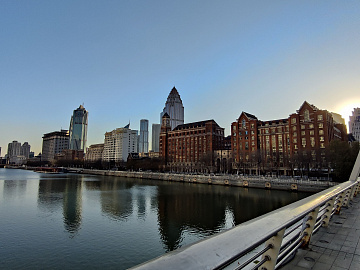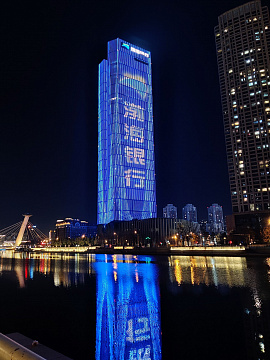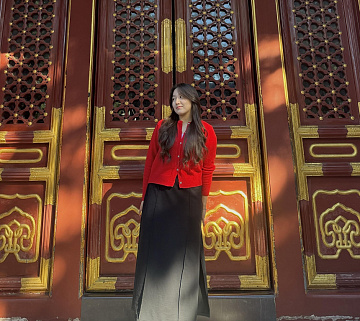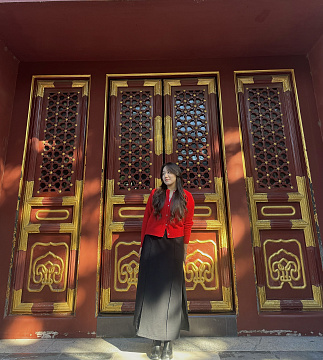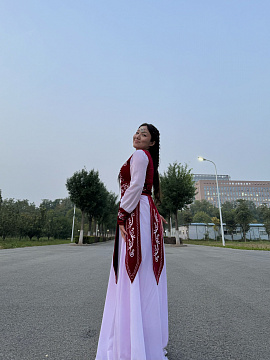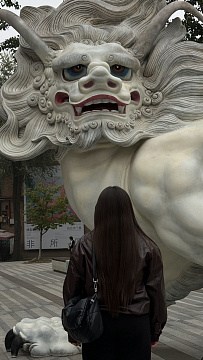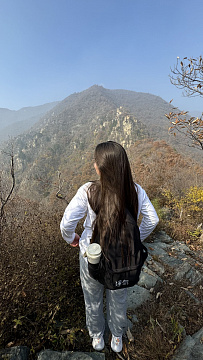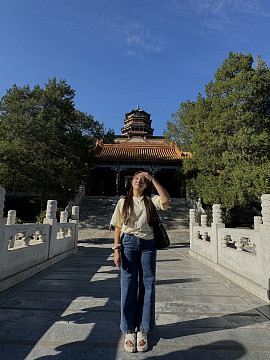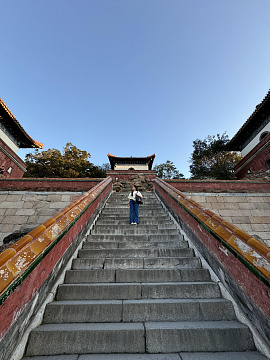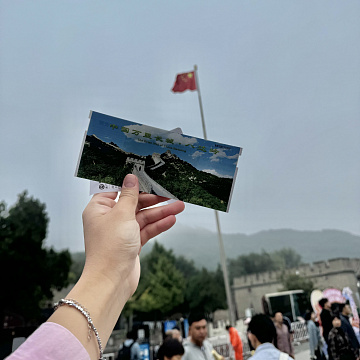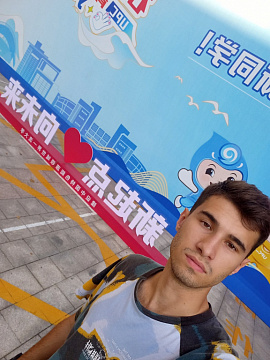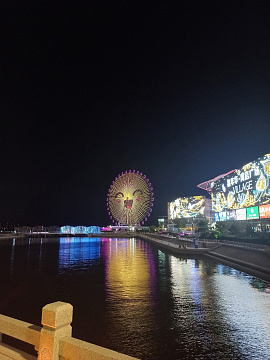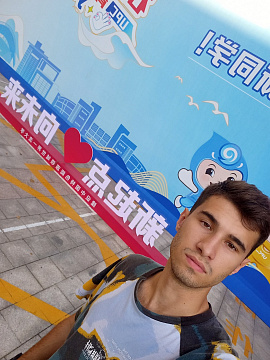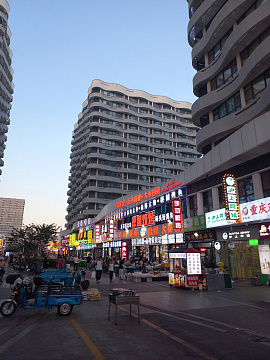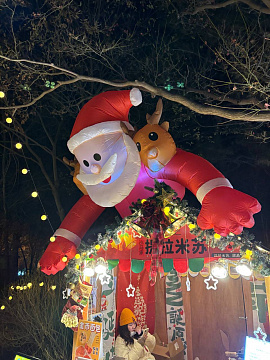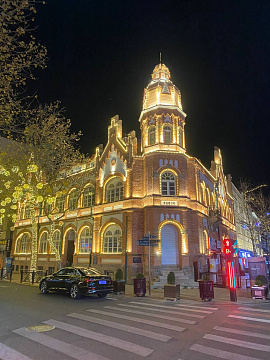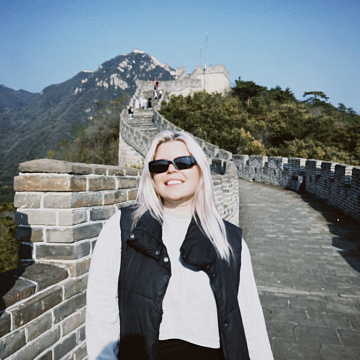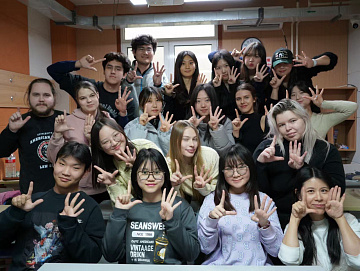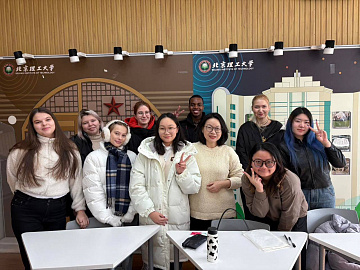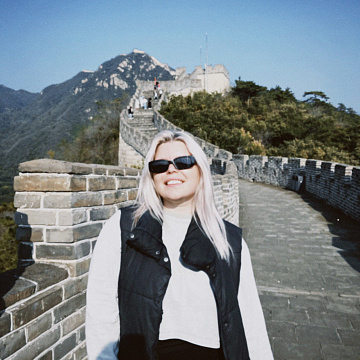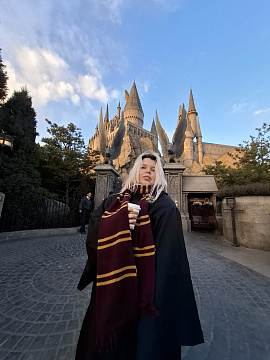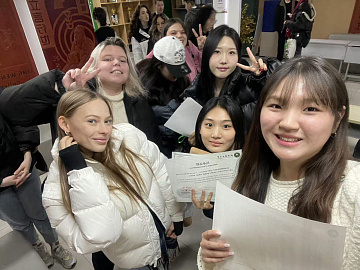
The internship was intense, educational, and unforgettable. I broadened my horizons, improved my English communication skills, participated in scientific discussions, and joined cultural activities. The program offered a great opportunity to gain a deeper understanding of Chinese culture and modern science.
What difficulties did you face during the preparation for the internship? What advice and recommendations can you give to future participants of academic mobility programs?
No major difficulties occurred.
Check the average temperature and humidity of the region during your trip to pack appropriate clothing.
Download offline maps and learn about the city’s transportation system (metro, buses, taxis) in advance.
Ask questions early and don’t hesitate to clarify details.
Consider exchanging currency beforehand or check if your bank cards will be accepted in the destination country.
Keep digital copies of all important documents in case they are lost.
Describe the visa application process. What advice can you give to future participants of academic mobility programs?
The F-type visa took 1 week to process. Required documents included an invitation from the university, a passport, and an application form.
Start the process early.
Double-check the list of required documents and verify processing times.
Ensure the invitation letter meets all the necessary requirements.
What difficulties did you face upon arrival at the host organization? What advice would you give to future participants?
Adapting to the climate, navigating the campus, and dealing with the language barrier were challenging.
Download offline maps, learn basic phrases in the local language, and ask volunteers for help with accommodation rules.
List your expenses related to the internship abroad (visa fees, travel costs, registration fees/taxes/deposits, insurance/medical services if used, public transport, meals, accommodation). Provide tips on reducing costs.
- Visa fees: 2,500 RUB
- Flight from Irkutsk to Beijing (round trip): 26,690 RUB
- Train from Beijing to Hefei (round trip): 14,194.45 RUB
- Metro: 80 RMB ≈ 1,160 RUB
- Medical insurance: 120 RMB ≈ 1,740 RUB
- Meals: ≈ 5,000 RUB
Plan your budget ahead of time

I have achieved significant results in the field of studies and foreign languages. I managed to improve my knowledge of both Chinese and English, and even successfully passed IELTS 7.0. I also gained valuable practical experience and significantly expanded my knowledge of Chinese culture and communication and living skills in China, which had a positive impact on both my studies and personal development.
What difficulties did you have at the stages of preparation for the internship? What tips and recommendations can you give to future participants of the academic mobility program?
I had to process all the documents as soon as possible, namely a medical certificate and personal information for the university. Also, there was no certainty about applying for a visa, so tickets were bought at the last moment. Therefore, the following advice: if a student has received an invitation letter to a Chinese university in June or July, you can already buy plane tickets at low prices and not wait for visa approval, since if you have an invitation letter, the visa will definitely be approved.
Describe the process of obtaining a visa. Your advice for future participants of the academic mobility program.
There were no problems with obtaining a visa, it was necessary to upload a certain package of documents to two websites, namely the university website and the visa application website, in order to download certain forms for submission to the consulate. The main thing is to wait for the invitation letter in order to buy tickets and apply for a visa with confidence.
What difficulties did you encounter upon arrival at the host foreign organization? Your advice to future participants of the academic mobility program.
There were no difficulties in settling in, we can only consider the adaptation process as such, since we had to figure out how to pay for purchases, where to eat and how to travel by public transport. Upon arrival, I recommend going to the bank (ICBC/Bank of Beijing/Bank of China) within the first week and applying for a bank card yourself.
Specify your expenses related to participation in an internship abroad (visa costs, cost of flight / travel to the place of internship, registration fees / taxes / deposits in the host organization, policy/medical services, if used, public transport, meals, accommodation. Your tips for cutting costs.
Visa 2500.; flight 40000-45000.; travel from the airport is free from the university, registration, check-in, SIM card and other fees on the first day of check-in in China 15000-20000.; Russian medical insurance 22000 (optional); Chinese medical insurance 6000; tuition fee 6000; travel by public transport: bus 15-75.; metro 50-120.; meals and other daily expenses 1000-1500. Everything is shown in rubles.

I have only positive impressions from this exchange program; I even felt a bit sad that it ended. Five months fly by very quickly when you are surrounded by people similar to you, among like-minded individuals who also love to travel, learn new things, meet others, and exchange cultural values.
Thanks to this program, I was able to improve my spoken English, gain invaluable knowledge in management and economics, develop my soft skills and networking abilities, visit numerous cultural and historical sites, learn about the intricacies of Chinese culture, and of course, make friends from all over the world: France, the Netherlands, Mongolia, Turkmenistan, Mexico, Poland, Morocco, Kazakhstan, Kyrgyzstan, and more.
This journey also motivated me to study hard and continue my education at INRTU so that I can participate in similar internship programs in the future.
What difficulties did you have at the stages of preparation for the internship? What tips and recommendations can you give to future participants of the academic mobility program?
There were no such difficulties. I would like to express my special gratitude to the Academic Mobility Department, which always responded quickly and clearly to questions and provided assistance throughout the process of gathering and submitting documents, as well as during the internship. The only advice I would give is to take care of everything in advance and never leave things until the last minute, as no one knows when someone might go on vacation, etc.
The visa application process was quite straightforward. There is a list of required documents, the consulate operates on schedule quickly and efficiently, and the staff speaks Russian, which makes the process even easier. The processing time for the visa is one week (if it is not urgent).
The only advice I would give is to be careful when gathering documents and to arrive at the consulate as early as possible to avoid long queues, which can take up to two hours.
What difficulties did you encounter upon arrival at the host foreign organization? Your advice to future participants of the academic mobility program.
Non-compliance with the expected living conditions for students. According to the terms of my program, the dormitory was supposed to be free and located on the university campus. However, upon arrival, we were placed in a dormitory outside the campus, a 40-minute walk from the academic buildings. This was the only and major disappointment from the host side.
I can't offer any advice, as no one expected this and was prepared for it. As far as I know, this is currently the only example of such a case.
Specify your expenses related to participation in an internship abroad (visa costs, cost of flight / travel to the place of internship, registration fees / taxes / deposits in the host organization, policy / medical services, if used, public transport, meals, accommodation. Your tips for cutting costs.
Financial Expenses:
• Visa – 2,500 RUB (X1)
• Registration fee – 500 RMB
• Medical examination – 4,700 RUB
• Flight to the destination – 14,475 RUB
• Return flight – 1,364 RMB
• Travel to the internship location – free (university bus)
• Dormitory deposit – 100 RMB (refundable upon check-out)
• Health insurance – 400 RMB
• SIM card, mobile plan – 400 RMB (for a year)
• University Wi-Fi – 10 RMB (per month)
• VPN for six months – 150 RMB
• One meal in the university cafeteria – 10-16 RMB
• Food delivery – 16-30 RMB
• Public bus – 2 RMB
• Metro – depends on the number of stations traveled
• Paid transfer between campuses – 6 RMB
Tips for Reducing Expenses:
1. Buy bedding sets at small markets, order from Taobao, and so on.
2. Eat in the university cafeterias.

The impressions are wonderful, it was very nice to get such a learning experience in another country. My dream came true, before I went and couldn't believe that I was going to study in a completely different country, it was extremely unusual for me.
I achieved quite good results in the training itself, at first it was not easy, but in the process I got used to it and it became much easier. I started to understand English better, even speak it better, being in an environment where there are a lot of guys fr om different countries, most of them speak English and it was necessary to get in touch, it's interesting. The trip also gave me the opportunity to develop in my interests, such as sports, in particular basketball.
The internship definitely brought benefits! I am glad that I had this opportunity and I was perfectly able to take advantage of it. I managed to get to know a lot of people, chat with them, and made a lot of new friends and acquaintances, which is a plus, of course. This experience set the direction for my future life. On a personal level, it has influenced me very positively, I have become more open, determined and generally much better! I can't tell you about the academic year yet, it's the holidays, we'll see what happens next.
What difficulties did you have at the stages of preparation for the internship? What tips and recommendations can you give to future participants of the academic mobility program?
First of all, the documents (application, certificates, visa, questionnaires), a lot of things had to be collected and prepared, but the main thing was to do it as soon as possible so that there would be no "surprises" later. And I think that morale plays a big role, because it was the first time I had such an experience, I didn't know what to expect, but it was worth it.
I would like to tell future participants of the program to prepare thoroughly and approach the matter seriously, perhaps this chance comes once and they need to take advantage of it.
Describe the process of obtaining a visa. Your advice for future participants of the academic mobility program.
The process is not difficult, the visa is done very quickly, about 3-5 days. You collect the necessary package of documents (they will give you a list) and go to the consulate, follow the instructions there and that's it, the main thing is not to forget your passport. The visa is paid, it costs 2500 rubles. The main thing is to save everything that the consulate will give you.
What difficulties did you encounter upon arrival at the host foreign organization? Your advice to future participants of the academic mobility program.
The main difficulty is to do all the necessary documents already in the country you came to. There are a lot of new things, everything is different and incomprehensible to you. The main thing is not to get lost, talk to everyone and be interested, people will definitely help. There are plenty of Russian speakers, at least in the university I attended. Register with the police on time, get a campus card, register a pass at the university, apply for a bank card, and apply for a mobile tariff.
The main advice is to install all the necessary applications before traveling, since everything we are used to does not work without a vpn. The most necessary: vpn, WeChat, Alipay, Chinese geographical maps. Also, do not take a lot of things, everything can be easily and simply purchased there. Take plenty of medicines and cash with you.
Specify your expenses related to participation in an internship abroad (visa costs, cost of flight / travel to the place of internship, registration fees / taxes / deposits in the host organization, policy / medical services, if used, public transport, meals, accommodation. Your tips for cutting costs.
Expenses:
- Visa 2500 rubles
- The flight from Irkutsk is 14,000 rubles one way, the price depends on the time of ticket purchase, I advise you not to rush to buy a ticket, but always monitor it. In the opposite direction, it depends on the amount of luggage, I flew for 16,000 rubles + extra. luggage space 4000 rubles = 20,000 rubles
- Travel to the internship site by high–speed train is about 350 yuan (4,500- 5,500 rubles), as well as taxi costs from the airport to the train station are about 100-150 yuan (1,500 rubles), the subway is inexpensive - 5 yuan (60-75 rubles). In total, about 7000 rubles will be released in China itself.
- The deposit for housing is 1,000 yuan (15,000 rubles)
- Accommodation for 5 months 3,000 yuan (40000-45000 rubles)
- Public transport is inexpensive: bus 1-3 yuan (15-45 rubles), metro 3-5 yuan (on average 45-75 rubles), taxi depends on the distance, but the minimum is 10 yuan (150 rubles)
- Meals per day for 30-40 yuan (500-700 rubles)
- On average, 1,500 to 2,000 yuan (20,000 to 35,000 rubles) was spent on living per month
Get around by metro, quickly and inexpensively. Order things from online platforms, they are much cheaper and the quality is good. There are many different places (cafes, restaurants) in the city wh ere it is inexpensive and delicious. Leisure is also inexpensive, and there are many free places to visit.

The internship at the Beijing Institute of Technology for Chinese Language Studies was an unforgettable experience for me. It allowed me to immerse myself deeply into Chinese culture and significantly improve my language level. Thanks to this opportunity, I was able to practice spoken Chinese with native speakers and significantly accelerate my comprehension and pronunciation.
One of the main achievements of this internship was that my Chinese language reached a level that allowed me to communicate fluently on everyday topics. I successfully mastered the coursework and passed the exams with flying colors.
On a personal level, this internship helped me expand my horizons and gain a deeper understanding of Chinese culture. It immersed me in the traditions, customs, and values of the Chinese people. This has made me more open-minded and tolerant towards other cultures.
Thus, the internship in learning Chinese has become a truly invaluable experience for me. It allowed me to improve my language skills and broaden my horizons. I am sure that the knowledge and experience gained will be useful to me in the future.
What difficulties did you have at the stages of preparation for the internship? What tips and recommendations can you give to future participants of the academic mobility program?
The internship in China involved solving various organizational issues. One of the main difficulties was dealing with money and payments in China, as most Russian bank cards do not work there. To overcome this challenge, I obtained a foreign bank card that is compatible with the Chinese payment system, Alipay. It is essential to plan ahead when sending money to China. Consider using reliable exchange services or bringing cash with you to avoid any delays or complications. If you have questions or need assistance, do not hesitate to reach out to the Mobility Department for help. They will be happy to assist you in solving any problems you may encounter.
Describe the process of obtaining a visa. Your advice for future participants of the academic mobility program.
Obtaining a visa for China is a relatively straightforward process. The university provided us with the necessary documents, including the application form and JW202 form, via email in a timely manner. I completed the form on the Chinese consulate's official website and presented the required documents to the consulate at the designated time. The documents were quickly accepted, fingerprints were collected, and a visa fee voucher was issued. A week later, my visa was processed and ready for use.
What difficulties did you encounter upon arrival at the host foreign organization? Your advice to future participants of the academic mobility program.
Upon arrival in China, we were greeted at the airport by representatives and volunteers from the host institution. They took us by bus to our accommodation. The initial difficulty was that we were unexpectedly located not on the university campus, but at a separate hostel. This caused us a lot of questions and concerns. However, we were soon reassured when we learned that the university provides free buses to and from the campus at specific times, so we would be able to get used to the arrangement in the future. Overall, there were no further difficulties with the organization of our stay.
Language was also a challenge at times, as English is not widely spoken in China. Although I had studied the language prior to my internship, it was still challenging to understand everyday conversations due to the differences in dialects. However, the Chinese people are generally friendly and positive. In most situations, we were able to communicate through a translator, and they were always willing to help.
Specify your expenses related to participation in an internship abroad (visa costs, cost of flight / travel to the place of internship, registration fees / taxes / deposits in the host organization, policy / medical services, if used, public transport, meals, accommodation. Your tips for cutting costs.
Visa expenses – 2,500 rubles.
Flight to Beijing with one suitcase – 14,000 rubles, return trip to Irkutsk with one suitcase - 30,000 rubles.
Accommodation during the internship is provided free of charge, as we were met by volunteers from the institute on buses.
Deposit for accommodation in a hostel – 100 yuan.
SIM card for one year – 500 yuan, policy for six months – 400 yuan.
Transport costs depend on the distance and mode of transportation. Bus fares range from 1-3 yuan for short distances, and 3-7 yuan for longer routes. Subway fares are generally 3-5 yuan.
Average lunch price in a cafeteria is 15-30 yuan, slightly higher off-campus (around 30-50 yuan).
To save money, it is recommended to use public transportation and eat in cafeterias, as taxi fares can be relatively high, and off-campus dining can be more expensive.

